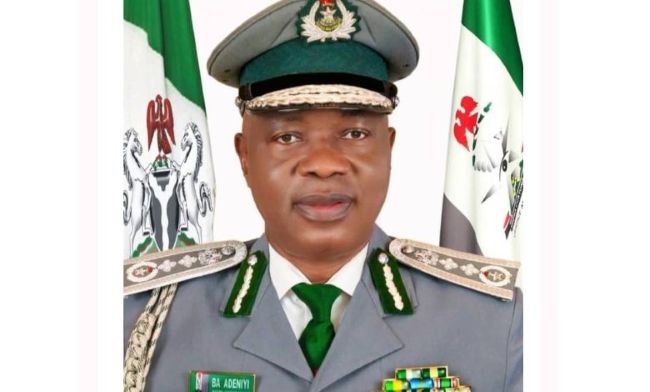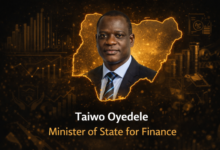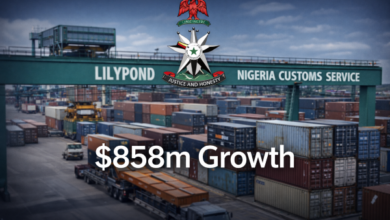Nigeria Customs Strengthens Ties with Netherlands to Modernise Trade and Port Operations

Deepens Maritime Cooperation with the Netherlands to Boost Trade Facilitation
Nigeria’s ambition to become West Africa’s leading trade hub received a major boost as the Nigeria Customs Service (NCS) deepened bilateral cooperation with the Netherlands on trade facilitation, port efficiency, and compliance management.
The two-day strategic mission, led by Comptroller-General Bashir Adewale Adeniyi, focused on studying Dutch customs systems — globally renowned for their precision, automation, and transparency — to accelerate Nigeria’s ongoing Customs Modernisation Programme and strengthen its role in the emerging Blue Economy.
This collaboration reflects Nigeria’s growing emphasis on seamless cargo clearance, digital transformation, and cross-border efficiency, aligning with President Bola Tinubu’s broader agenda to expand non-oil revenues through smarter trade infrastructure.
Inside the Netherlands Study Tour: Data, Discipline, and Digital Efficiency
The high-level NCS delegation engaged with Dutch Customs experts, port managers, and finance officials in a series of institutional briefings and technical workshops aimed at replicating proven international models.
Highlights included a presentation by Ed Tulp, leader of the National Tariff Classification Team (TeamLTT), who explained how the Netherlands uses digital tools for tariff classification, origin verification, and risk-based inspection systems — cutting clearance times while maintaining security standards.
A follow-up session on Risk Management, delivered by Dennis van der Wolk of the Customs National Tactical Centre (DLTC), showcased the Dutch model for real-time cargo profiling, data analytics, and tactical decision-making.
“The Netherlands’ systematic approach demonstrates how data-driven processes can balance trade facilitation with national security,”
said CG Adeniyi. “Nigeria Customs is determined to apply similar global best practices to safeguard revenue while making trade easier.”
Port of Rotterdam: Lessons for Nigeria’s Blue Economy Vision
One of the major highlights of the visit was the Port of Rotterdam tour — Europe’s busiest seaport and a model for Nigeria’s Lekki Deep Sea Port ambitions. The NCS team observed advanced cargo-tracking systems, intermodal logistics, and pre-arrival clearance models that allow near-frictionless cargo movement.
Adeniyi described the visit as “an eye-opener,” noting that integrated collaboration between customs, port operators, and logistics firms is crucial for unlocking Nigeria’s maritime competitiveness.
“What we’ve seen here reinforces the importance of synergy — Customs cannot operate in isolation. We need structured partnerships that prioritise efficiency, transparency, and technology-driven coordination,” Adeniyi noted.
Bilateral Meetings with Dutch Ministries: Building the Framework for Partnership
At the Netherlands Ministry of Foreign Affairs, both governments discussed long-term frameworks for technical assistance, staff training, and capacity-building exchanges.
Further meetings at the Ministry of Finance explored formal collaboration on tariff standardisation, risk management systems, gender inclusion, and trade facilitation reforms.
The sessions culminated in what the Comptroller-General described as “a constructive platform to translate insights into actionable reforms that will modernise Nigeria’s Customs architecture.”
Driving a New Customs Era: Beyond Enforcement to Facilitation
The NCS’s outreach to the Netherlands aligns with its broader transformation strategy to move from a revenue-collection agency to a trade-enabling institution. The visit emphasised three critical priorities:
- Automation of Processes: Transitioning from manual operations to end-to-end digital trade management.
- Risk-Based Inspection: Using intelligence-driven profiling to reduce clearance bottlenecks and curb corruption.
- Partnerships and Learning: Deepening collaboration with global customs networks for knowledge exchange and capacity building.
These reforms, when fully implemented, are expected to enhance Nigeria’s ranking in the World Bank’s Ease of Doing Business Index, reduce clearance times, and position Nigerian ports as regional trade gateways.
BRANDECONOMY ANALYSIS: Maritime Diplomacy and Economic Transformation
The NCS–Netherlands partnership marks a turning point in Nigeria’s journey toward a globally competitive maritime economy. The visit underscores that Customs reform is not merely a bureaucratic upgrade — it’s a national economic imperative.
The Netherlands, long established as a logistics powerhouse, exemplifies how transparent, technology-driven customs systems can elevate national trade performance. For Nigeria, replicating this success requires:
- Institutional Discipline: Sustained enforcement of automation and compliance standards across ports.
- Public-Private Collaboration: Integrating port operators, shipping lines, and logistics firms into reform planning.
- Policy Consistency: Ensuring political transitions do not disrupt long-term customs modernisation efforts.
- Maritime Workforce Development: Upskilling officers to adapt to a digitised and intelligence-led customs ecosystem.
If Nigeria fully adopts these lessons, it could reduce smuggling, strengthen fiscal revenues, and position itself as West Africa’s maritime hub under the Blue Economy agenda — transforming ports from choke points into engines of growth.










